Estimating DAX Query Completion Time
Usually, DAX queries execute very fast, like flashes in a gold seeker’s pan. Sometimes, however, you could end up with a massive DAX query that takes minutes if not hours. For example, a financial institution requested credit monitoring results to be evaluated overnight and saved in a relational database for fast retrieval. The query involved processing some 300+ measures for 40 million customers and took about an hour to complete. While working on optimizing the query and tracing its execution, I enabled the VertiPaq SE Query End event and was able to monitor how far the query got by seeing which measure is being processed. This was also useful to understand which measures are more expensive.

In general, the server doesn’t process measures in parallel. A measure may produce multiple storage queries, some in parallel and some sequentially. The VertiPaq SE Query End event would show the SQL-like query that the server sent to the storage engine, but usually you can easily correlate it to the DAX formula of the measure being processed. Thanks to the performance enhancements Microsoft is making, such as horizontal fusion, multiple measures may be coalesced into the same storage operation, and therefore a query with multiple measures might yield parallelism or could be sequential. On the other hand, there is plenty of parallelism within a Vertipaq query.




